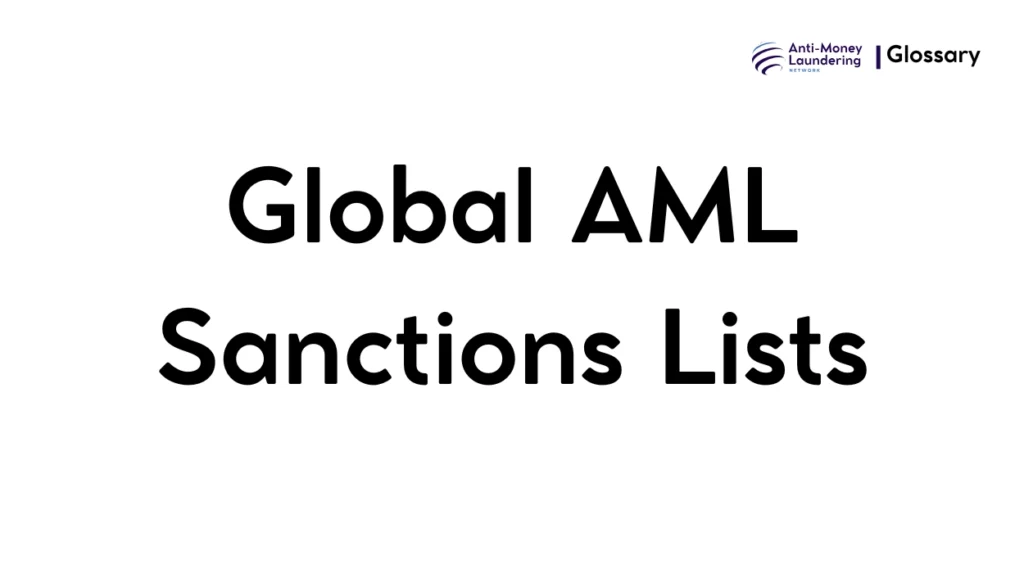Definition
Global AML Sanctions Lists are authoritative compilations of individuals, entities, vessels, and countries that are subject to restrictions, penalties, or prohibitions due to their involvement or suspected involvement in money laundering, terrorism financing, weapons proliferation, human rights violations, or other illicit activities. These lists are maintained and issued by international bodies, national governments, and regional organizations as part of anti-money laundering (AML) efforts to prevent financial crimes and protect the integrity of the global financial system.
Purpose and Regulatory Basis
The purpose of Global AML Sanctions Lists is to provide financial institutions and compliance officers with a reference to screen and block transactions involving high-risk individuals or entities. They function as preventive tools to deter money laundering, terrorism financing, and related crimes by restricting access to financial systems and assets. The regulatory basis for these sanctions lists is rooted in international agreements and national laws, guided by key frameworks such as the Financial Action Task Force (FATF) Recommendations, the USA PATRIOT Act, and the European Union’s Anti-Money Laundering Directives (AMLD). These frameworks require institutions to perform due diligence and sanctions screening to ensure compliance and mitigate regulatory risks.
When and How it Applies
Global AML Sanctions Lists apply primarily during customer due diligence (CDD) and transaction monitoring. Financial institutions must screen individuals and entities before onboarding customers, during ongoing monitoring, and when processing transactions that may involve sanctioned jurisdictions or parties. For example, a bank will check incoming wire transfers against sanctions lists to ensure neither sender nor recipient is listed, preventing illicit funds from flowing through the system. Triggers for screening include new client onboarding, cross-border payments, trade financing, and suspicious activity reporting. Failure to comply can lead to significant regulatory penalties and reputational damage.
Types or Variants
Sanctions lists vary widely, reflecting different issuing bodies and purposes:
- United Nations Security Council (UNSC) Consolidated List: Targets terrorism, nuclear proliferation, human rights violations.
- U.S. Office of Foreign Assets Control (OFAC) Specially Designated Nationals (SDN) List: Targets individuals and entities posing a threat to U.S. national security or foreign policy.
- European Union Consolidated Financial Sanctions List: Lists persons and entities banned by the EU.
- National Lists: Individual countries such as the UK (OFSI Consolidated List), Canada, and Australia maintain their own lists.
- Thematic Lists: Target specific risks like weapons proliferation or cybercrime.
- Commercial and Third-Party Lists: Aggregated and enriched lists provided by private vendors for screening purposes.
Procedures and Implementation
Financial institutions implement sanctions screening through a combination of automated systems and manual controls. The typical steps include:
- Integration of up-to-date sanctions lists into screening software.
- Screening of client data and transactions against these lists at onboarding and continuously.
- Investigation of positive matches (potential hits) through enhanced due diligence.
- Reporting confirmed matches to relevant authorities.
- Freezing or blocking assets related to sanctioned parties.
- Ongoing review and updates to ensure system accuracy and compliance.
Impact on Customers/Clients
From the customer’s perspective, being on or linked to a sanctions list can restrict access to banking services, international transactions, travel bans, and asset freezes. Financial institutions must ensure fair treatment while adhering to restrictions, balancing customer rights with legal compliance. Customers may face delays or rejections in transaction processing if screening identifies potential sanctions matches.
Duration, Review, and Resolution
Sanctions listings often remain in place until regulatory authorities decide to lift or amend them based on political or legal developments. Financial institutions have ongoing obligations to keep their screening systems updated and to periodically review customers for sanctions compliance. Delisting or resolution requires formal procedures by authorized entities, and affected individuals or entities may appeal their status.
Reporting and Compliance Duties
Institutions have strict compliance duties including accurate documentation of screening processes, prompt reporting of detected sanctions hits to regulators, periodic internal audits, and training of personnel. Penalties for non-compliance can include heavy fines, criminal sanctions, and license revocation. Regulatory agencies conduct frequent examinations to assess institutions’ sanctions screening effectiveness.
Related AML Terms
Global AML Sanctions Lists are closely linked with terms such as Customer Due Diligence (CDD), Know Your Customer (KYC), Transaction Monitoring, Politically Exposed Persons (PEP), Enhanced Due Diligence (EDD), and Suspicious Activity Reporting (SAR).
Challenges and Best Practices
Key challenges include frequent updates to sanctions lists, high false-positive rates due to name variations and commonalities, and managing cross-border compliance complexities. Best practices involve investing in automation with AI-enhanced screening, regular staff training, employing advanced analytics for risk-based screening, and maintaining strong governance frameworks.
Recent Developments
Recent trends include increased regulatory scrutiny on sanctions evasion tactics, expanded use of technology such as artificial intelligence and machine learning to improve screening accuracy, and evolving global coordination among regulatory bodies to harmonize sanctions enforcement.
Global AML Sanctions Lists are critical instruments in the fight against financial crime, providing financial institutions with authoritative data to prevent illicit financial flows. Compliance with sanctions screening requirements strengthens institutions’ risk management and assures alignment with international regulatory standards, which is vital for safeguarding the integrity of the global financial system.

